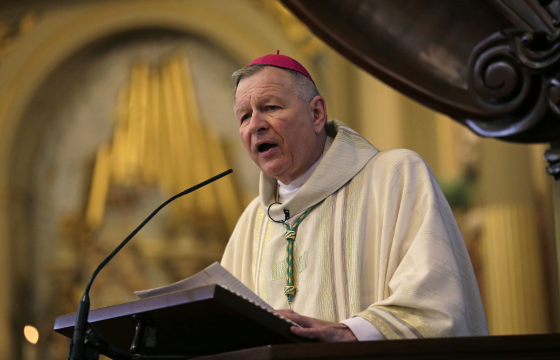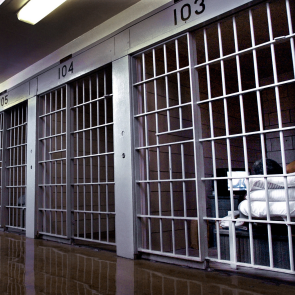The US Conference of Catholic Bishops are among more than 100 religious leaders who have rallied against a district attorney who is using the Bible to argue successfully for the death penalty.
The multi-faith group of respected Christian and Catholic institutions filed an amicus brief to the Louisiana Supreme Court in a bid to stop the execution of Rodricus Crawford, 27, who convicted in 2013 of killing his one-year-old son.
Crawford was convicted of smothering his son, though the pathology report is disputed as his son was discovered to have been suffering from pneumonia with sepsis. Crawford, who is the second youngest man on death row in Louisiana, is in solitary confinement 23 hours a day.
Dale Cox, the district attorney for Caddo Parish in Louisana, “misused and misinterpreted” the Bible to secure a death penalty for Crawford.
"Signers grieve every wrongful death," said the amicus brief, which is a legal document that a party with specific knowledge can file to court to be used in evidence in either prosecution or appeal. "But signers do not believe that further death at the hands of the government is a just or moral response."
The religious leaders, which include Catholic bishops, priests, Christian ministers, senior rabbis, other ordained clergy and religious leaders who signed the brief "have a substantial interest in ensuring that Louisiana courts are fair and juries are not wrongfully persuaded to impose the death penalty by a prosecutor's personal interpretation of the Bible", the brief said.
The brief continued by calling Mr Cox’s conduct "inappropriate and unconstitutional".
"The prosecutor, as an agent of the state of Louisiana, should not have misused and misinterpreted passages in the Bible to support his call to the jury for the execution of Mr Crawford. The prosecutor's own private interpretations of the Bible are his own and he is entitled to his own opinions," it added.
"The problem is that at critical times the prosecutor, Mr Cox, acting as an official agent of the State of Louisiana, publicly injected his own private religious interpretations of the Bible into the trial as the State's justification to argue for the execution of Mr. Crawford. Mr. Cox's statements are particularly egregious in a parish that leads the country in executions per capita and primarily due to the efforts of Mr Cox."
The first instance where Mr Cox misinterpreted the Bible was during the cross-examination of the Rev John Dent Sr during the penalty phase of the trial.
Under cross examination, Cox asked the pastor if he agreed that scripture attributed to Jesus Christ means "an earthly life would be terminated for harming a child". Rev Dent did not agree with Mr Cox's interpretation, the brief says.
In a second instance, Mr Cox quoted the scripture again at the end of the penalty phase of the trial when the jury is asked to decide between life in prison or death.
"He [Jesus] said, to the adult, who would harm one of these, 'one of these' referring to small children, ‘Woe be unto you, who would harm on of these’, adding that Jesus said in the New Testament: 'It would be better if though you were never born. You shall have a millstone cast around your neck and you will be thrown into the sea."
The full passage in Luke 17 reads: “It would be better for him if a millstone were put around his neck and he be thrown into the sea than for him to cause one of these little ones to sin. Be on your guard! If your brother sins, rebuke him; and if he repents, forgive him. And if he wrongs you seven times in one day and returns to you seven times saying, ‘I am sorry,’ you should forgive him.”
Mr Cox, 67, is the unelected acting district attorney for Caddo Parish, or county, which accounts for nearly half of the Louisiana's death sentences in the past five years. Further, from 2010 to 2014. more people were sentenced to death per capita in Caddo Parish than in any other county in the United States, among counties with four or more death sentences in that time period.
Mr Cox is a divisive figure in the US legal community.
Mr Cox, in an interview this summer, said: “I think we need to kill more people. … I think the death penalty should be used more often.”
He also wrote to the probation office of the state after the death penalty was handed out to Crawford and stated: “I am sorry that Louisiana has adopted lethal injection as the form of implementing the death penalty. Mr Crawford deserves as much physical suffering as it is humanly possible to endure before he dies.”
 Archbishop Gregory M. Aymond of New Orleans is one of the 108 signatories of the amicus brief (PA)
Archbishop Gregory M. Aymond of New Orleans is one of the 108 signatories of the amicus brief (PA)
Bill Quigley, who filed the amicus brief to the Louisiana Supreme Court, told the local newspaper The Shreveport Times that he was confident that the death sentence would be overturned.
"He [Mr Cox] is there as a representative of our government," Mr Quigley said. "It is not the position of the government and has never been the position of the government that the Bible is the basis for killing people.
"This is unprecedented. We have never had 100 religious leaders in the state come out in a death penalty case, and I think it just shows how outrageous it is. I think it shows a real critique of the prosecutorial conduct in Caddo Parish."
The brief noted that most major faiths in the United States oppose the death penalty. Among the religious groups it cited was the US Conference of Catholic Bishops, which says: "Since 1999, the (USCCB) has called for the end of the death penalty in the USA stating 'opposition to the death penalty is important not only for what it does to those guilty of horrible crimes but what it does to all of us as a society.'"
Other groups cited in the brief include the American Baptist Churches USA, the American Friends Service Committee, the American Jewish Committee, the Central Conference of American Rabbis, The Church of the Brethren, the Episcopal Church, the Christian Church (Disciples of Christ), the Mennonite Church, the National Council of Churches, the Presbyterian Church, the Reformed Church in America, the United Church of Christ, the United Methodist Church and the Unitarian Universalist Association.
Of the 108 signers, 59, or more than half, are Catholics. They included Archbishop Gregory M. Aymond of New Orleans and Bishops Michael G. Duca of Shreveport, Shelton J. Fabre of Houma-Thibodaux, Ronald P. Herzog of Alexandria, Michael Jarrell of Lafayette, Robert W. Muench of Baton Rouge, and Glen J. Provost of Lake Charles. Other Catholic signers included Jesuit Father Fred Kammer, head of the Jesuit community in New Orleans and former head of Catholic Charities USA, and Sister Helen Prejean, a Sister of St. Joseph who for decades has been an active opponent of capital punishment and advocate for inmates sentenced to death.
KEEP UP TO DATE ON TWITTER...
Follow all the latest news and events from the Catholic world via The Tablet's Twitter feed @the_tablet




 Loading ...
Loading ...